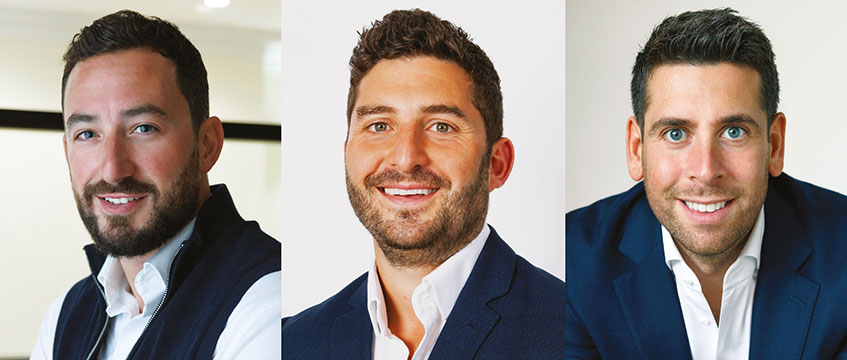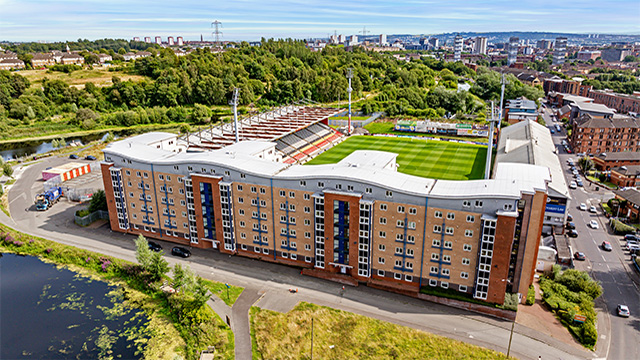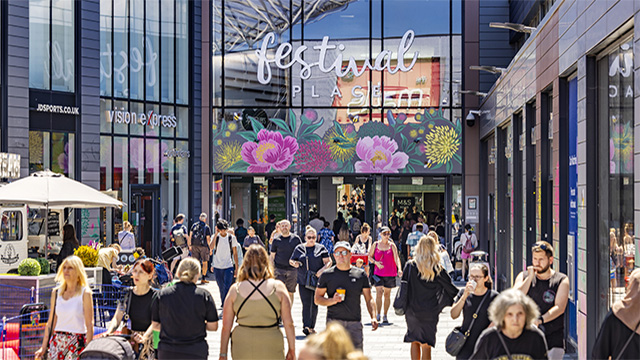Tri7 plans to make unloved offices sing and dance
Slipping into the meeting room in asset manager Tri7 Group’s offices in London’s West End, Ben Beck is slightly red-faced after rushing across London from his daughter’s nativity play.
The journey involved a couple of Lime bikes, with a pit stop between when one ran out of beans, and some hurried pedalling, which left him similarly out of beans. But it was worth it: “She was the best donkey I’ve ever seen!” he beams.
Not letting her steal the limelight, Beck has been putting on a show of his own as a newly appointed partner of Tri7 Group and managing director of TriOffice, the company’s nascent value-add office investment fund.
Slipping into the meeting room in asset manager Tri7 Group’s offices in London’s West End, Ben Beck is slightly red-faced after rushing across London from his daughter’s nativity play.
The journey involved a couple of Lime bikes, with a pit stop between when one ran out of beans, and some hurried pedalling, which left him similarly out of beans. But it was worth it: “She was the best donkey I’ve ever seen!” he beams.
Not letting her steal the limelight, Beck has been putting on a show of his own as a newly appointed partner of Tri7 Group and managing director of TriOffice, the company’s nascent value-add office investment fund.
Within a month of launching in October, the fund had acquired its first asset, through a joint venture with fellow investor Pears Group, and is eyeing others as it seeks to accumulate assets totalling £250m-£300m over the next three years.
According to Dan Green, senior partner at Tri7 Group, the speedy acquisition of the 10-storey, 55,385 sq ft 55 Spring Gardens in Manchester for £13m from Aviva Investors was a statement of intent.
“That was really important for us,” says Green: “That showed we were really committed, that we did have the funding in place and we believe in what we are doing.”
Act I
To understand how the company intends to make its mark, you need to look back to its origins. Founded in 2018 by Sam Castle, the other member of the Tri7 triumvirate, alongside Alex Bowman, who stepped away from the business in 2023, the company initially focused on managing the assets of family, friends and high-net-worth individuals.
With time, however, ambitions grew. “They sat there saying, ‘Every time we find a deal, we are running around to find the equity – surely there is a more efficient way to do this,’” says Green, who was associate director at Firethorn Trust and joined the Tri7 team in 2022.
In mid-2021, the company agreed a deal with private equity firm Alchemy Partners to make opportunistic investments in UK city and town centre real estate, backed by a commitment of £100m. And the deals flowed, starting with Core, a 200,000 sq ft shopping centre in Leeds.
Acquired from Columbia Threadneedle in 2021, Tri7 received planning approval last year to build an 807-bed, 36,000 sq ft student accommodation block on-site with joint venture partner and specialist PBSA developer Fusion Group. “We have now done just over £100m for Alchemy,” Green says. “It’s brilliant on the PBSA front, loads of traction really.”
Other deals include the acquisitions of a vacant former Mecca Bingo hall in Wood Green in north London from developer U+I for £21.5m and a derelict brownfield site in Loughborough, Leicestershire, from Charnwood Borough Council. Both received planning consent to be turned into student housing last year, totalling 1,177 beds.
“But,” Green adds, “we were very, very focused – if that market slightly wobbled or stagnated then we were exposed.”
Enter stage left
Beck had been overseeing deals as an investment manager at Columbia Threadneedle and later as a director at investor Blue Coast Capital.
“I have always been opportunistic – value-add investing, but always cross-sector,” he says. “About 18 months ago the sentiment [in the office market] was incredibly weak and I found an opportunity to acquire an office off-market [for Blue Coast].”
The building was Hyphen, a 63,000 sq ft office building at 75 Mosley Street in Manchester’s central business district, owned by developer Boultbee Brooks. Under its previous owner, “everything that could go wrong in a business plan had gone wrong”, Beck says.
This included the company spending “a fortune” to reposition two buildings into one in a back-to-frame refurbishment and then, since the building was being delivered during the pandemic, the contractor went bust. Even when the building was eventually finished, leasing activity was slow and rents were behind as hybrid working patterns proliferated.
“They basically got to the point where there was this fantastic, finished asset and they just wanted to get rid of it,” Beck says. “That was the ‘penny drop’ moment for me. If you can acquire great quality assets in great quality locations at substantial discounts… there has to be a counter-cyclical strategy in this.”
[caption id="attachment_1269066" align="aligncenter" width="847"] Tri7 and Fusion Group’s 541-bed PBSA scheme at Limehurst Avenue in Loughborough[/caption]
Putting the pieces together
While these character arcs ran independently, Castle, Green and Beck already knew one another. “Sam and Ben happened to play golf together,” says Green. “We’ve known each other for about 25 to 30 years. We kind of grew up together.”
While on the green, Castle and Beck got talking about the new strategy that Beck was working on and, soon after, Castle was pitching the idea of bringing him on board to Green.
The three decided that their combined experience and expertise gave them a good platform from which to launch TriOffice. What the strategy now focuses on, Beck says, is ruthless stock selection and prioritising liquidity at the point of exit.
“The standout winners in this cycle will be people who are very disciplined and true to their strategy,” Beck adds. “You can’t buy your way out of a bad location. And sure, we will miss out on opportunities because we are very disciplined on location. But I believe that the buildings we buy will perform that much better because we are only buying things which we 100% believe in.”
Setting the scene for success
These buildings are, broadly speaking, in the big six regional cities – Birmingham, Bristol, Edinburgh, Glasgow, Leeds and Manchester – as well as London.
While Green and Beck do not close the door on other secondary markets where tight supply presents an opportunity, such as Brighton and Cambridge, they say deals there would only occur in rare circumstances.
“I think the first three or four deals that we do are likely – not definitely – to be in those major conurbations,” says Beck. “It’s easier because there is more stock in those larger markets.”
Green adds: “I think if we were to look at those [secondary cities] it would be the slightly smaller lot size, and we would have to be much more comfortable with the liquidity at exit.
“If you are actually trying to get an international investor to buy an office in one of those kinds of secondary locations, it’s much more difficult, so it’s London and the top six initially, and we need to be super-focused on that.”
In London, Beck says, the City is in play rather than the West End, where high valuations and strong rents have reduced value-add opportunities. He adds that the team will be hyper-focused on location, right down to the street. After that, the focus is on more granular detail to establish whether assets in these locations have the right fundamentals to become great buildings.
He points to 55 Spring Gardens: “The location is right in the heart of the CBD, on a road which has always been synonymous with the office market within Manchester.”
Tick.
“The building we bought is a corner building, so you have natural light on three sides, because there is a break on the other side as well where there is a small road,” he continues.
Tick.
“You have great floor-to-ceiling heights and a huge volume of space in the reception area.” That, Beck adds, is important: “Often, one of the big challenges with offices is how to create more space in the reception area. You walk in, you want to create something impressive – but there isn’t space. We have bought a building which already has a huge volume of space.”
Tick. All clear.
“It is trying to identify buildings which already have those raw ingredients that are capable of making a great building, but knowing that we are going to have to spend capex to push that on to really make it sing and dance,” Beck says.
Exit stage right
Factoring all of that in, as well as the company’s £250m-£300m goal, Green and Beck say the company will target assets valued at £40m-£50m in London and £10m-£30m in the regions. After holding them for around three to five years, the targeted exit value would be £60m-£80m in the regions and anywhere up to £200m in London – anything more would limit the asset’s liquidity, the team says.
“The biggest thing for me with the office strategy is that exit liquidity,” says Green. “I believe the institutions will come back in three or four years’ time. But are they going to come back in trying to buy five or six assets at £50m or one at £250m?”
His gut, he says, leans to the former. Beck agrees, but adds: “You don’t want to be too bullish. A lot of parties now, the way they get comfortable with buying, for instance, in the West End, is that they put loads of rental growth in and really sharp exit yields.
“But we are more worried about returning what we say we are going to – anyone can make a model work if you put certain assumptions in,” he says with a smile.
It is that track record, of doing what they say they will, which they credit for their existing deals and predict will bring them more in the future.
While they are reticent to be bullish with their numbers, they are certainly bullish about their prospects.
“We are trying to acquire assets. We want to own,” says Beck. “There is definitely a bit of momentum, but into 2025 I think there will be considerably more.”
Fin.
Portraits: L-R Ben Beck, Dan Green and Sam Castle © Amber Pollack Photography/Tri7 GroupLoughborough image © Tri7 Group/Fusion Group











